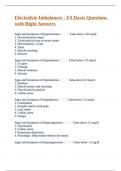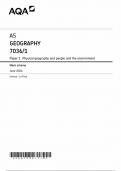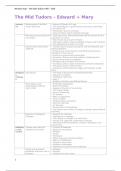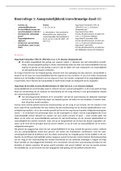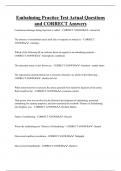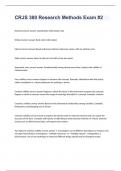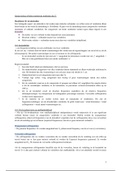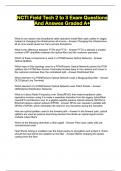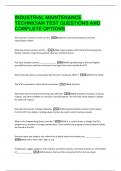Lecture 1 Theory
Supply management (ISM’s definition): Identification, acquisition,
positioning, and management of inputs and supplier relationships.
Purchasing (CIPS’ definition): The transactional processes concerned with
acquiring goods and services, including payment of invoices.
Procurement (CIPS’ definition): The processes concerned with developing and
implementing strategies to manage an organization’s spend portfolio to
contribute to the organization’s overall goals.
Sourcing (CIPS’ definition): The activities within the procurement process
concerned with identifying and evaluating potential suppliers, engaging with
selected suppliers and selecting the best value suppliers.
Objectives of supply management:
Ensure timely availability of resources.
Identify, assess, and mitigate supply chain risk.
Reduce total costs of ownership (before, during and after transaction)
Enhance quality of resources.
Access technology and innovation from suppliers.
Foster sustainability in upstream supply chains.
Supply management process
Specifying
Can be done:
Detailed:
o Specification with no ambiguity
o Avoids misunderstanding
o Can discourage supplier innovation
Functional:
o Global specification
o Leaves details to suppliers/ may create misunderstanding
o Can encourage supplier innovation
Internal alignment is important
Ordering
Purchase order (PO): A document issued by a buyer to a supplier, indicating
types, quantities, and agreed prices for products or services the supplier will
provide to the buyer. PO does not constitute a contract until it has been
accepted by the seller.
• Blanket PO: Purchase order that covers a period, used for recurring needs for
expendable goods.
• Open-end PO: Addition of items and/or extension of time.
Expediting
Follow-up: Routine order tracking to ensure the delivery.
Follow-up may be built into the electronic system for low-value purchases.
,Expediting: Application of pressure on supplier to meet the delivery date, deliver
ahead of schedule, or speed up delivery of delayed order.
Use of expediting should be subject to cost and benefit analysis.
Recurring use of expediting may suggest that the buyer’s purchasing
process needs improvements.
Sustainability: Meeting “the needs of the present without compromising the
ability of future generations to meet their own needs.” (UN Brundtland
Commission, 1987)
Corporate sustainability: Meeting the “triple bottom line” (Elkington, 1994; 1997)
of economic, environmental, and social goals.
Tripple bottom line:
Lecture 1 Papers
Making sustainability sustainable - Montabon, F., Pagell, M., & Wu, Z.
Majority of research regarding sustainable supply chains has followed an
instrumental logic: placing economic interests ahead of environmental and social
interests: “Is it good for the firm?”
Firms are attempting to become less unsustainable, but compensating practices
do not create truly sustainable supply chains.
This conceptual study seeks to move the field from the question of:
How can firms merely diminish environmental or social problems
To:
How supply chains can become truly sustainable.
The propositions provide a new framework of ecologically dominated sustainable
supply chain management. The fundamental argument we make is that:
The Ecologically Dominant logic can lead to the development of
sustainable supply chains; the instrumental logic cannot.
,Instrumental logic:
- Decisions tend to focus on incremental changes to the supply chain that
are done with relatively short time horizons.
- The end result is organized irresponsibility where the improvements made
lead to being less unsustainable but cannot lead to sustainability because
the trade-offs inherent in sustainability are never fully addressed.
Ecologically Dominant logic:
- Supply chain managers start by assessing the impact of their economic
activity on the environment and society.
Considers a wide range of stakeholders and outcomes and forces the
supply chain to focus on doing no harm.
Identify opportunities to refocus existing practices toward harm
elimination instead of profit maximization. These changes require a
- Long time horizon
- Willingness to take responsibility for the organization (even when that
means not satisfying certain customer demands)
Shareholder value effects of ethical sourcing: Comparing reactive and proactive
initiatives - Kim, S., & Chae, S. (2022).
Ethical sourcing Initiatives ESI: a firm’s formal and informal actions to manage
sourcing processes in an ethical and socially responsible manner.
Study shows that stock market reacts positively to ESI.
Thinking differently about purchasing portfolios: An assessment of sustainable
sourcing - Pagell, M., Wu, Z., & Wasserman, M. E. (2010).
Kraljic was the driving force behind the concepts of supply management and
purchasing portfolios; proposing a new approach that embraced globalization,
technology and risk.
Recently, leaders in SSCM were not organizing purchasing portfolios in the
manner suggested by Kraljic: managers who should have been leveraging their
supply base on multiple dimensions and exploiting relative power over suppliers
in commodity-type markets, were instead developing the types of relationships
typically associated with strategically important inputs.
, Lecture 2 Theory
Identify potential sources:
Preparing for supplier selection:
Prequalification
o Determine selection criteria based on specification.
o Prepare the list of potential suppliers.
Next Steps
o Select 3 to 5 potential suppliers (short list).
o Send out RFI, RFQ, RFP, or RFB (next slide).
o Tentative supplier evaluation.
o Rank the suppliers based on the evaluation criteria.
Communication with potential suppliers
o Request for information (RFI): Not a solicitation, information gathering
only.
o Request for quotation (RFQ): Price comparison tool. Specification is fixed
already. Focus is on price.
o Request for proposal (RFP): Complex requirement in which price is only
one of the key decision factors.
o Request for bid (RFB): Used in competitive bid processes. Request
for participation in auctions.
Supplier information sources
Secondary data Primary data
Commercial databases and yellow Sales contacts and interviews, Visits to
pages, Trade agencies, Trade journals: suppliers and sample, Standard
New products and materials, Trade information requests - RFI, RFQ, RFB,
directories and RFP
Colleagues, networking, professional Colleagues, networking, professional
contacts, and references contacts, and references
Sedex and EcoVadis: companies rating sustainability performance.
Criteria for supplier selection
Key challenge Matching the organization’s needs to
what the market can supply
Traditional criteria Cost, quality, delivery and flexibility:
CQDF
Additional criteria Innovation, sustainability, etc.
Assessing environmental and social performance of the suppliers is more difficult
than assessing than traditional economic performance (CQDF), as it is more
Supply management (ISM’s definition): Identification, acquisition,
positioning, and management of inputs and supplier relationships.
Purchasing (CIPS’ definition): The transactional processes concerned with
acquiring goods and services, including payment of invoices.
Procurement (CIPS’ definition): The processes concerned with developing and
implementing strategies to manage an organization’s spend portfolio to
contribute to the organization’s overall goals.
Sourcing (CIPS’ definition): The activities within the procurement process
concerned with identifying and evaluating potential suppliers, engaging with
selected suppliers and selecting the best value suppliers.
Objectives of supply management:
Ensure timely availability of resources.
Identify, assess, and mitigate supply chain risk.
Reduce total costs of ownership (before, during and after transaction)
Enhance quality of resources.
Access technology and innovation from suppliers.
Foster sustainability in upstream supply chains.
Supply management process
Specifying
Can be done:
Detailed:
o Specification with no ambiguity
o Avoids misunderstanding
o Can discourage supplier innovation
Functional:
o Global specification
o Leaves details to suppliers/ may create misunderstanding
o Can encourage supplier innovation
Internal alignment is important
Ordering
Purchase order (PO): A document issued by a buyer to a supplier, indicating
types, quantities, and agreed prices for products or services the supplier will
provide to the buyer. PO does not constitute a contract until it has been
accepted by the seller.
• Blanket PO: Purchase order that covers a period, used for recurring needs for
expendable goods.
• Open-end PO: Addition of items and/or extension of time.
Expediting
Follow-up: Routine order tracking to ensure the delivery.
Follow-up may be built into the electronic system for low-value purchases.
,Expediting: Application of pressure on supplier to meet the delivery date, deliver
ahead of schedule, or speed up delivery of delayed order.
Use of expediting should be subject to cost and benefit analysis.
Recurring use of expediting may suggest that the buyer’s purchasing
process needs improvements.
Sustainability: Meeting “the needs of the present without compromising the
ability of future generations to meet their own needs.” (UN Brundtland
Commission, 1987)
Corporate sustainability: Meeting the “triple bottom line” (Elkington, 1994; 1997)
of economic, environmental, and social goals.
Tripple bottom line:
Lecture 1 Papers
Making sustainability sustainable - Montabon, F., Pagell, M., & Wu, Z.
Majority of research regarding sustainable supply chains has followed an
instrumental logic: placing economic interests ahead of environmental and social
interests: “Is it good for the firm?”
Firms are attempting to become less unsustainable, but compensating practices
do not create truly sustainable supply chains.
This conceptual study seeks to move the field from the question of:
How can firms merely diminish environmental or social problems
To:
How supply chains can become truly sustainable.
The propositions provide a new framework of ecologically dominated sustainable
supply chain management. The fundamental argument we make is that:
The Ecologically Dominant logic can lead to the development of
sustainable supply chains; the instrumental logic cannot.
,Instrumental logic:
- Decisions tend to focus on incremental changes to the supply chain that
are done with relatively short time horizons.
- The end result is organized irresponsibility where the improvements made
lead to being less unsustainable but cannot lead to sustainability because
the trade-offs inherent in sustainability are never fully addressed.
Ecologically Dominant logic:
- Supply chain managers start by assessing the impact of their economic
activity on the environment and society.
Considers a wide range of stakeholders and outcomes and forces the
supply chain to focus on doing no harm.
Identify opportunities to refocus existing practices toward harm
elimination instead of profit maximization. These changes require a
- Long time horizon
- Willingness to take responsibility for the organization (even when that
means not satisfying certain customer demands)
Shareholder value effects of ethical sourcing: Comparing reactive and proactive
initiatives - Kim, S., & Chae, S. (2022).
Ethical sourcing Initiatives ESI: a firm’s formal and informal actions to manage
sourcing processes in an ethical and socially responsible manner.
Study shows that stock market reacts positively to ESI.
Thinking differently about purchasing portfolios: An assessment of sustainable
sourcing - Pagell, M., Wu, Z., & Wasserman, M. E. (2010).
Kraljic was the driving force behind the concepts of supply management and
purchasing portfolios; proposing a new approach that embraced globalization,
technology and risk.
Recently, leaders in SSCM were not organizing purchasing portfolios in the
manner suggested by Kraljic: managers who should have been leveraging their
supply base on multiple dimensions and exploiting relative power over suppliers
in commodity-type markets, were instead developing the types of relationships
typically associated with strategically important inputs.
, Lecture 2 Theory
Identify potential sources:
Preparing for supplier selection:
Prequalification
o Determine selection criteria based on specification.
o Prepare the list of potential suppliers.
Next Steps
o Select 3 to 5 potential suppliers (short list).
o Send out RFI, RFQ, RFP, or RFB (next slide).
o Tentative supplier evaluation.
o Rank the suppliers based on the evaluation criteria.
Communication with potential suppliers
o Request for information (RFI): Not a solicitation, information gathering
only.
o Request for quotation (RFQ): Price comparison tool. Specification is fixed
already. Focus is on price.
o Request for proposal (RFP): Complex requirement in which price is only
one of the key decision factors.
o Request for bid (RFB): Used in competitive bid processes. Request
for participation in auctions.
Supplier information sources
Secondary data Primary data
Commercial databases and yellow Sales contacts and interviews, Visits to
pages, Trade agencies, Trade journals: suppliers and sample, Standard
New products and materials, Trade information requests - RFI, RFQ, RFB,
directories and RFP
Colleagues, networking, professional Colleagues, networking, professional
contacts, and references contacts, and references
Sedex and EcoVadis: companies rating sustainability performance.
Criteria for supplier selection
Key challenge Matching the organization’s needs to
what the market can supply
Traditional criteria Cost, quality, delivery and flexibility:
CQDF
Additional criteria Innovation, sustainability, etc.
Assessing environmental and social performance of the suppliers is more difficult
than assessing than traditional economic performance (CQDF), as it is more

